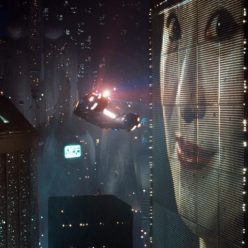Ryoji Ikeda is a musician and visual artist working with installation. His process centres around numbers- the link between music and mathematics. Transfinite is composed of two projections, binary code and infinite numbers pulled from the human genome and astronomical coordinates, as well as a sound piece composed by Ikeda, to which the projections respond.
For me, Ikeda is an artist who is extremely adept at turning very abstract concepts and visuals into experiences that don’t patronise or confuse the audience, but stand stubbornly on their own, devoid of explanation. Infact, Ikeda is notorious for his refusal to talk about the concepts in his work (as he makes abundantly clear in his ‘interview’ for the observer: http://observer.com/2011/05/infinite-quest-ryoji-ikeda-wants-to-disappear/ ) insisting that his approach is more pragmatic. He would rather not focus on his ideas or concepts, so as not to influence or over complicate the experience the work generates, and this approach seems to make his highly technical, abstract compositions surprisingly accessible.
Though for most viewers, the strobing of binary code appears as merely a maze of flashing lines, the atmosphere they conjure in conjunction with Ikeda’s composition is undeniable. His ability to utilise projection to construct an environment in which this can be experienced is impressive. This approach to abstraction may seem obtuse to some, but personally I can’t help but be inspired by Ikeda’s determination to wilfully disregard his authorship, and allow the work to be what the work IS. Like Tarkovsky insisting, in responce to allegations from the Soviet State Committee for Cinematography that Stalker was too dull and slow, “The film needs to be slower and duller.”
I hope that in my film, despite absence of narrative i can focus on atmosphere through attention to composition and colour choices, the relationship between form & meaning (digital processes to critique problems inherently digital in nature), in order to be as direct yet fluid in concept as Ikeda.
